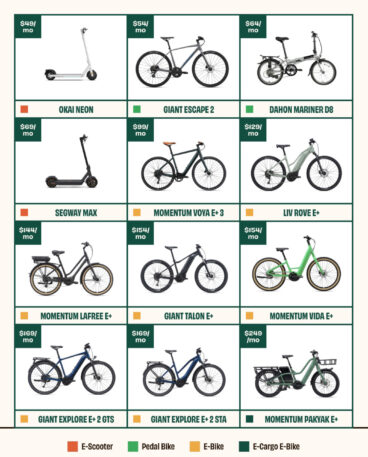
09 Feb The newest company perk? An e-bike subscription
E-bike sales are surging. But for those who aren’t ready to drop thousands of dollars on a high-end bike, some employers are starting to offer another option: an e-bike subscription as a company perk.
Ridepanda, a Bay Area startup, works with companies like Amazon and Google to offer employees a catalog of micromobility options, from lightweight electric bikes to scooters, cargo bikes, folding bikes, and regular nonmotorized bikes. Workers who want to use one of the vehicles can keep it at home with a month-to-month subscription, with the fee subsidized by their employer. In many cases, the company pays the whole bill; the average subsidy is $125 per month, which covers most bikes on Ridepanda’s platform.
For companies with climate targets, it’s one way to help reduce their carbon footprint. “We offer this program to Google employees to support our sustainability goals and traffic reduction efforts by giving employees options to get to work without having to drive alone in their cars,” says Jessica Sanborn, a Google spokesperson.
The system works: Ridepanda says that on average it replaces 6.5 car trips each week per rider at a company. “Before joining Ridepanda, about 74% of our riders never or very rarely commuted by bicycle or scooter,” says Charlie Depman, chief technology officer at Ridepanda. “After joining, 84% commute a few times a week by bike or scooter, and some of them do that daily.”
Bala Devarajan, a software engineer at an Amazon office in Silicon Valley, says he hadn’t considered biking to work before joining the program. But with his company covering the cost, he was able to use a high-end bike that he wouldn’t have purchased for himself.
When commuting from an apartment 5 miles away from the office, “I realized that biking would take maybe two minutes more than if I drove,” he says. “And I wouldn’t have the stress of sitting in traffic—I could just use the bike lane and pass all the cars.” He lives farther away now, but takes the bike with him on the local train when the weather’s good, and rides for part of his commute.

When employees sign up for the program, they can go pick up the bike or scooter at a local Ridepanda hub where someone checks the fit and helps them get used to riding it. (In many cases, members haven’t ridden a bike in years.) The bike comes with a helmet, lock, tire pump, and theft insurance. If the bike ever needs maintenance, or if someone decides that they want to try a different model, they can return to the hub.
Cofounder Chinmay Malaviya previously worked at Lime, the company known for its shared electric scooters and e-bikes. He says one challenge with bikeshare systems is that a one-size-fits-all bike doesn’t work for some riders; by offering more choices, more people may want to ride. And having a bike at home means that someone won’t have to worry about whether they’ll find a shared bike to use on their commute, though it also means having to find a place to store a bike in a sometimes small apartment.
Ridepanda initially launched as a direct-to-consumer offering, though it switched to working with employers because the process was easier to manage—now they can assemble and fit bikes for each customer, for example, rather than shipping them—and because the subsidy helps bring in new riders who might not have been considering a bike.
For now, the program is available in the Bay Area, Seattle, and the New York City area. But Ridepanda is eyeing expansions to Washington, D.C., Austin, and other cities, based on where employer interest is high. Companies have motivations beyond sustainability, including the simple fact that parking is expensive.
“If you’re looking at constructing a new parking garage, each spot is $30,000 in a ‘tier 1’ city,” Depman says. “So anything that these employers can do to avoid building more parking is a boon for them.” Parking shortages are also common. The company is in discussion with a hospital in Portland, Oregon, where employees have a seven-year wait for a parking spot.
A potential policy change could help the startup expand more—the proposed Bicycle Commuter Act would let companies offer a pretax benefit for bike commuting, which would lower a company’s taxable income. Similar policies in Europe have already made bike subscriptions for employees much more common there.
Source: Fast Company




Sorry, the comment form is closed at this time.